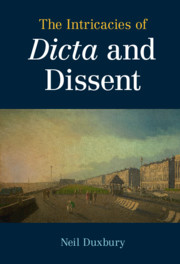Introduction
from Essay I - Dicta
Published online by Cambridge University Press: 30 July 2021
Summary
We digress when, in intending to make a point, we either temporarily or permanently deviate from it. Digressions can be deliberate or unconscious. They can be to good or bad – or a mixture of good and bad – or to no effect. Distinguishing the digressive from the non-digressive is not always straightforward: comments offered as asides can strike at the very heart of a matter, just as narrative which a reader thinks peripheral might be the author’s fil conducteur. Common-law judges often digress in the course of making legal decisions. The standard characterization of these digressions is that they are observations which are not integral to a decision that has been reached – that they could be taken out of a judgment without that judgment being undermined. The full legal Latin term for these observations is obiter dicta.
- Type
- Chapter
- Information
- The Intricacies of Dicta and Dissent , pp. 3 - 124Publisher: Cambridge University PressPrint publication year: 2021



